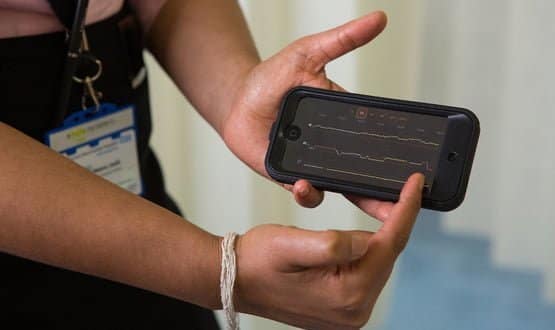Digital sensors implemented at Heathrow quarantine facility
- 20 April 2020

Chelsea and Westminster Hospital NHS Foundation Trust and its charity CW+ have been involved in implementing digital solutions at a facility near Heathrow airport which has been set up for quarantined travellers.
A wearable sensor, called the Sensium system, is attached to the individual’s chest and measures key vital signs every two minutes. The device monitors respiratory rate, temperature and heart rate of those individuals in quarantine.
The data can be seen by health care staff and can be used to generate notifications to let staff know if the patient’s health condition is deteriorating.
As well as helping to monitor patient deterioration, the data will form part of a trial called the Remote-Covid study.
The aims of the study include; understanding which people are most severely affected by Covid-19, reducing the potential exposure to staff – with current systems, staff have to put on a significant amount of personal protective equipment in order to check on a quarantined person – and collecting feedback from patients and staff about the technology and most importantly to see if it reduces exposure for the healthcare team to Covid-189.
The facility and the study are being funded by the CW+ Covid-19 Rapid Response Fund, and is supported by Sensium.
Dr Gary Davies, consultant respiratory physician at the trust, said: “Thanks to the amazing response from donors and Sensium we are able to provide 500 patches with the required software and training at the facility near Heathrow. We hope that this is the first of many innovative initiatives we can roll-out in the coming weeks to help save more lives in these unprecedented times.”
Chelsea and Westminster Hospital NHS Foundation Trust and their charity, CW+, have launched the Covid-19 Rapid Response Fund to help our staff provide the best possible care for these patients.
The COVID-19 Rapid Response Fund will support our hospitals in three key areas:
- New equipment – including ventilators, blood gas machines and patient vital-sign monitors
- New technology – including remote monitoring devices, digital consultation tools and mobile tablets
- Support for frontline staff – including the creation and establishment of health and wellbeing hubs at our hospitals to provide respite, information and refreshment for our teams; and the recruitment and deployment of a specialist volunteer workforce to support staff and patients on our wards and across our organisation




